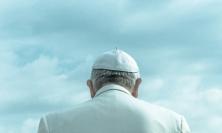Continuing their conversation about Fratelli tutti, Jan Regner SJ invites James Hanvey SJ to expand on what he has written elsewhere about the parable of the Good Samaritan, which frames the second chapter of Fratelli tutti, leading us into the contemplative dimension of the encyclical. They go on to discuss the hallmarks of Francis’ papacy, and the way in which the pandemic has affected the practice of faith.
- Read part 1: Freedom, joy and friendship >>
- Read part 2: Politics and the common good >>
To some extent, this links with my response to the previous question. There is more than one way of looking at the world and its complex truths. We not only need the power of both a well-formed and informed critical reason, but we also need our intuitions, affective dimension, imagination and, of course, our spiritual powers. We need to educate and form all of these and I think that is what happens not only in a good education but especially in our spiritual and devotional lives. One of the effects of prayer is to expand our heart and our minds. It gives us new eyes for seeing the world and for seeing God’s presence and work within it. In the Spiritual Exercises, before we are invited to join Christ in his mission, there is a sort of pedagogy, a school in which we come to see the world from God’s perspective, in all its complexity and need. This is the world to which the Father sends the Son and it is the world in which the creative, healing and gathering work of the Holy Spirit is always present. But God’s way of looking at our world – Jesus’s way of looking at and being in our world – is not the methodological neutrality of the scientist or the detachment of someone who is interested, maybe even concerned, but has no essential investment in it. Instead, God looks upon the world with the penetrating eyes of truth and love. God sees through our defences and our masks. God sees us and God’s look is one of compassion, mercy, joy and delight in us, but it is also one in which there is suffering and, in all these moments, God is drawn ever more deeply into our world. Contrary to what we might expect, God does not abandon or reject us.
For all the different elements in Fratelli tutti, and sometimes we would have to admit that it can be a bit long, it always invites us to look at our world through the eyes of Christ. Of course, Christ never erases or makes those who are poor, lost or marginalised disappear. For him, they are never an embarrassment or an inconvenience. As such, with Fratelli tutti, if we read it as a contemplation on our lives, relations, politics, longings and hopes, then I think we will experience it not so much as a piece of writing but as a personal address, a prayer and a pleading. You can hear the heartfelt prayer at §35, especially in the repeated Spanish, ‘Ojalá.’ I think this is all very Ignatian and, of course, that way of ‘looking’ with the heart and the intellect is also the necessary prelude to any discernment for action.
I think there are eight characteristics of Francis’ papacy that are so evident, whatever the circumstances:
1) Christ – especially Christ in his humility, mercy, inclusiveness of the outsiders and love of the poor. From these Christological emphases comes his own pastoral and teaching emphases;
2) mercy and compassion;
3) the focus on the poor and those on the periphery;
4) the commitment to renewal and reform – especially with regards to abuse and the recovery of the vision of Vatican II;
5) Francis’ pastoral reality, to which he is open and attentive. This is the way in which he provides a safe and loving space for all men and women, whoever they are. Much like the father in the parable of the prodigal son, he always welcomes the son home. The son knows he is secure in the father’s love. And it is a love that faces the realities of the situation;
6) patience and discernment;
7) humility, which comes from his own sense of failure, but also from his knowledge that he is only a servant of Christ; and
8) I think he is a pope who is genuinely open to the Holy Spirit and attentive to the Spirit’s promptings, even when that can make things long and difficult – this is the measure of Francis’ freedom and fidelity.
I believe the time of the Covid pandemic can help Christians to live our faith in a more authentic way. Of course, for many, it will also be a time in which our faith is tested and questioned, a time of anxiety and loss. But it is in such moments that we discover that, no matter how profound our philosophies, there are no answers to the mysteries of suffering and the strange unpredictable contingencies of our lives. There are not answers, there is only God and all our questions ultimately lead to the person of Christ, crucified and risen, who is with us until the end of time. At our baptism, we are given a candle and the Church asks us to keep that light burning, for it will light our way through the world and bring us home to Christ. It is his light that burns in us through the gift of the Holy Spirit. But it is not just a light for ourselves. It is a light which we also carry for others, that they may not stumble or, if they do or if they get lost, then they can find their way again by the light that our lives and our faith provide.
As I suggested above, there are always those works of love and care that are needed, especially at this time. Such acts, no matter how small, are witnesses that the darkness will never triumph, and the light will never be put out. Those works, however, spring from the life of faith nourished in prayer and in the sacraments. I think that, during this time, many people have discovered prayer again and maybe even found new ways of praying. A number of our retreat houses have moved their work and their programmes online, so even more people can now access them. Many have also discovered that they really like attending Mass virtually in other countries or other parishes and towns. Although these can never be a substitute for our actual presence, nevertheless, we are discovering the richness and extensiveness of our Catholic Church. There is a real generosity and heroism which has come to the surface and that, I think, is itself a grace. Perhaps, too, whether it is online, or it is just in the daily routines of prayer and living, we touch again the reality of the community of faith. We are held in this community, both seen and unseen, here and now, and also gathered into the presence of God. In faith, we are never alone.
James Hanvey SJ is Secretary of the Service of the Faith for the Society of Jesus. He was speaking to Jan Regner SJ, Editor of Jezuité, the Czech Jesuit cultural review, in which this interview will also be published.
- Read part 4: Finding Christ in the world >>






